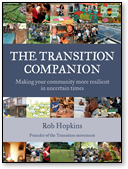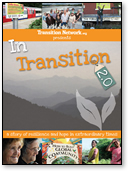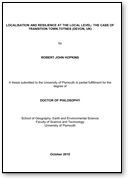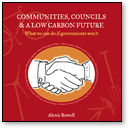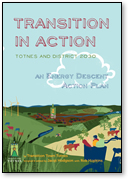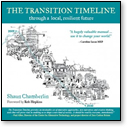Transition Culture has moved
I no longer blog on this site. You can now find me, my general blogs, and the work I am doing researching my forthcoming book on imagination, on my new blog.
Come find me at robhopkins.net
Archive for “Transport” category
Showing results 21 - 25 of 50 for the category: Transport.
17 Jul 2009
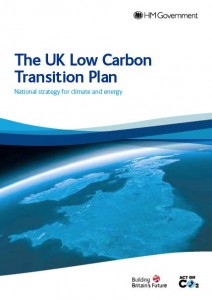 After many months of Ed Milliband putting himself out there are a Secretary of State for Energy and Climate Change that actually gets climate change, finally his big Plan, the UK Low Carbon Transition Plan was unveiled on Wednesday, in a speech in the House of Commons that namechecked Transition Towns and which is the boldest national vision for a low carbon society yet seen. Many others have since pitched in with their thoughts, I thought it might be useful here to offer an analysis from a Transition perspective. In his speech, Milliband said “we know from the Transition Towns movement the power of community action to motivate people..”, clearly an outcome of his attendance as a ‘Keynote Listener’ at the Transition Network conference in May. So how does the Plan measure up, and does it actually advance what Transition initiatives and the wider relocalisation movement are doing?
After many months of Ed Milliband putting himself out there are a Secretary of State for Energy and Climate Change that actually gets climate change, finally his big Plan, the UK Low Carbon Transition Plan was unveiled on Wednesday, in a speech in the House of Commons that namechecked Transition Towns and which is the boldest national vision for a low carbon society yet seen. Many others have since pitched in with their thoughts, I thought it might be useful here to offer an analysis from a Transition perspective. In his speech, Milliband said “we know from the Transition Towns movement the power of community action to motivate people..”, clearly an outcome of his attendance as a ‘Keynote Listener’ at the Transition Network conference in May. So how does the Plan measure up, and does it actually advance what Transition initiatives and the wider relocalisation movement are doing?
Read more»
12 Mar 2009
 A couple of weeks ago I was in London, and I visited Coin Street Community Builders (CSCB) on the South Bank. CSCB are a fascinating initiative, one that can teach a great deal to Transition Initiatives. For me, a Transition initiative, once it has created its EDAP, needs to morph, and become in effect, a relocalisation agency, a developer, a housing association, a bank. CSCB have done many of these things, and their experience is invaluable.
A couple of weeks ago I was in London, and I visited Coin Street Community Builders (CSCB) on the South Bank. CSCB are a fascinating initiative, one that can teach a great deal to Transition Initiatives. For me, a Transition initiative, once it has created its EDAP, needs to morph, and become in effect, a relocalisation agency, a developer, a housing association, a bank. CSCB have done many of these things, and their experience is invaluable.
Read more»
7 Jan 2009
 I often liken breaking our collective and individual addiction to oil as being like giving up any other addiction. My family has now passed its fifth month without a car, and the process of getting used to life with no car has been very similar to giving up drinking or smoking. I can’t for a moment say that it has been easy and hassle-free, but at the same time, we are still here, no-one has starved to death or died of boredom, life goes on, and we are, in many ways, the better for it. What I want to do here is not to give some rosy ‘it’s been so easy’ account of the process, but rather to give a warts’n’all account of where we have got to, in order to stimulate discussion and debate.
I often liken breaking our collective and individual addiction to oil as being like giving up any other addiction. My family has now passed its fifth month without a car, and the process of getting used to life with no car has been very similar to giving up drinking or smoking. I can’t for a moment say that it has been easy and hassle-free, but at the same time, we are still here, no-one has starved to death or died of boredom, life goes on, and we are, in many ways, the better for it. What I want to do here is not to give some rosy ‘it’s been so easy’ account of the process, but rather to give a warts’n’all account of where we have got to, in order to stimulate discussion and debate.
Read more»
24 Nov 2008
 I was in London over the weekend, seeing a concert at the Alexandra Palace by the utterly wonderful Sigur Ros, which was indeed utterly wonderful. The next day, en route home, we went to Camden Market, and my eye was caught by this great T-shirt on one of the stalls. I had never considered Mr T a hero of the no-fly movement, but of course “I ain’t getting on no plane” was one of his catchphrases. Unfortunately Mr T wasn’t motivated by climate change, nor by the results of the Oil Vulnerability Audit he did for the A-Team’s activities, rather a sheer terror of setting foot on aircraft (something to do with his Vietnam experiences).
I was in London over the weekend, seeing a concert at the Alexandra Palace by the utterly wonderful Sigur Ros, which was indeed utterly wonderful. The next day, en route home, we went to Camden Market, and my eye was caught by this great T-shirt on one of the stalls. I had never considered Mr T a hero of the no-fly movement, but of course “I ain’t getting on no plane” was one of his catchphrases. Unfortunately Mr T wasn’t motivated by climate change, nor by the results of the Oil Vulnerability Audit he did for the A-Team’s activities, rather a sheer terror of setting foot on aircraft (something to do with his Vietnam experiences).
Read more»
12 Nov 2008
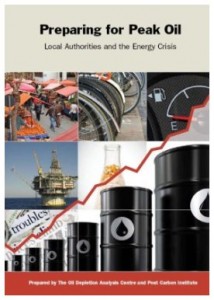 ‘Preparing for Peak Oil: Local Authorities and the Energy Crisis’, prepared by the Oil Depletion Analysis Centre and the Post carbon Institute. 2008. 41 pages. Free download here.
‘Preparing for Peak Oil: Local Authorities and the Energy Crisis’, prepared by the Oil Depletion Analysis Centre and the Post carbon Institute. 2008. 41 pages. Free download here.
The whole question of how to communicate peak oil to local government, and how to support and encourage their creative and rapid responses to it, is huge and very timely. ‘Preparing for Peak Oil’ is an excellent guidebook for anyone who wants to bring their local authority up to speed on energy depletion and climate change issues. It is clear, well presented, and achieves an excellent balance between presenting the hard facts about peak oil alongside some positive and inspiring examples of change, as well as some clear and well thought through thinking tools.
Read more»
 After many months of Ed Milliband putting himself out there are a Secretary of State for Energy and Climate Change that actually gets climate change, finally his big Plan, the UK Low Carbon Transition Plan was unveiled on Wednesday, in a speech in the House of Commons that namechecked Transition Towns and which is the boldest national vision for a low carbon society yet seen. Many others have since pitched in with their thoughts, I thought it might be useful here to offer an analysis from a Transition perspective. In his speech, Milliband said “we know from the Transition Towns movement the power of community action to motivate people..”, clearly an outcome of his attendance as a ‘Keynote Listener’ at the Transition Network conference in May. So how does the Plan measure up, and does it actually advance what Transition initiatives and the wider relocalisation movement are doing?
After many months of Ed Milliband putting himself out there are a Secretary of State for Energy and Climate Change that actually gets climate change, finally his big Plan, the UK Low Carbon Transition Plan was unveiled on Wednesday, in a speech in the House of Commons that namechecked Transition Towns and which is the boldest national vision for a low carbon society yet seen. Many others have since pitched in with their thoughts, I thought it might be useful here to offer an analysis from a Transition perspective. In his speech, Milliband said “we know from the Transition Towns movement the power of community action to motivate people..”, clearly an outcome of his attendance as a ‘Keynote Listener’ at the Transition Network conference in May. So how does the Plan measure up, and does it actually advance what Transition initiatives and the wider relocalisation movement are doing?




